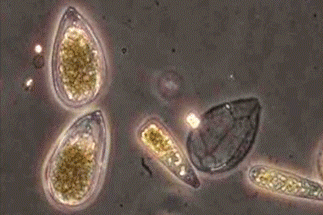All Parasites articles
-
 News
NewsNew antimalarial drug candidate shows potential for fighting resistance and reducing malaria transmission
Researchers have developed a new antimalarial drug candidate designed to address the growing challenge of drug resistance and potentially reduce malaria transmission.
-
 News
NewsScientists discover fungus that kills toxic algae threatening human health
A team of researchers have discovered a previously unknown species of marine fungus that can kill harmful, bloom-forming algae. The new species, Algophthora mediterranea, is a form of microscopic chytrid fungus that can occupy a broad range of hosts.
-
 News
NewsNew study reveals that parasite-produced dopamine can alter host behaviour
A new study has shed light on how Toxoplasma gondii, the causative agent of toxoplasmosis, can alter host behaviour. The research findings show that such behavioural changes are achieved, at least in part, through dopamine manipulation caused by dopamine produced by the parasite itself.
-
 News
NewsNew tools saved a million lives from malaria last year but progress under threat as drug resistance rises
Wider use of new tools against malaria, including dual-ingredient nets and WHO-recommended vaccines helped to prevent an estimated 170 million cases and 1 million deaths in 2024, according to WHO’s annual World Malaria Report.
-
 News
NewsToxoplasmosis: How a deadly parasite infects its host cells
Researchers have discovered how the parasite Toxoplasma gondii builds a specialised structure that allows it to move and invade host cells. They identified two proteins that control how the conoid complex is assembled - this acts like an engine for movement and cell-invasion.
-
 News
NewsMalaria parasites move on right-handed helices
After penetrating the skin, the malaria parasite moves with helical trajectories, almost always turning toward the right. Researchers demonstrated that the pathogen uses these right-handed helices to control its motion as it transitions from one tissue compartment to another.
-
 News
News$3.7 million awarded for research into sand flies, vectors of parasitic disease leishmaniasis
Professor Gideon Wasserberg at UNC Greensboro has been awarded a prestigious $3.7 million National Institutes of Health R01 grant to advance his research on controlling sand flies, the vectors of the parasitic disease leishmaniasis.
-
 News
NewsAMI warns that the threat of antimicrobial resistance in viruses and other pathogens cannot be underestimated
Applied Microbiology International (AMI) has urged global policymakers to strengthen the revised Global Action Plan on Antimicrobial Resistance (GAP-AMR), calling for a more inclusive, clear and equitable approach to tackling one of the world’s most urgent health challenges.
-
 News
NewsSingle-dose malaria treatment combining four existing drugs as effective as more onerous multi-day, multi-dose regimen
Hundreds of malaria patients participating in a clinical trial in Gabon in West Africa were cured via a single dose of a treatment that utilizes four widely available malaria drugs, according to a new study.
-
 News
NewsCracking leishmaniasis: new DNA test to track infection
A new study offers an innovative way to track the spread of leishmaniasis, a parasitic disease affecting both animals and humans. Researchers developed a fast, reliable method to identify sand fly species, detect Leishmania parasites, and determine the source of their blood meals from a single sample.
-
 News
NewsAccessible imaging technique can predict cardiac risks in patients with Chagas disease
A simple imaging exam capable of assessing myocardial deformation during contraction has emerged as a promising tool for predicting the risk of cardiac complications in patients with chronic Chagas disease.
-
 News
NewsWarmer Nordic springs double the incidence of avian malaria
A unique long-term study, in which biological samples were collected from the same population of blue tits over a 30-year period, shows that rising spring temperatures have doubled the incidence of avian malaria in southern Sweden.
-
 News
NewsMalaria risk in the Amazon is higher in regions with intermediate forest degradation
Research shows that areas with 50% deforestation near residential areas or fragmented vegetation allow greater contact between mosquitoes and humans. The study helps us understand the link between forest destruction and the spread of the disease.
-
 News
NewsHorizon Awards 2025: Dr Manu De Rycker named as winner of WH Pierce Prize
Dr Manu De Rycker, a Principal Investigator at the University of Dundee, has been named as the newest winner of the WH Pierce Global Impact in Microbiology Prize.
-
 News
NewsNew compound cuts off protein supply to parasites
There is an urgent need for new active ingredients that are capable of circumventing existing resistances in malaria. Researchers have now identified a new drug candidate, ’Substance 31’, which could enable the development of a new malaria drug.
-
 News
NewsAI tool beats humans at detecting parasites in stool samples, study finds
Scientists have developed an artificial intelligence (AI) tool that detects intestinal parasites in stool samples more quickly and accurately than traditional methods, potentially transforming how labs diagnose parasitic infections around the world.
-
 News
NewsNew insights into malaria could reshape treatment
A sodium pump essential to the malaria parasite’s survival, PfATP4, has emerged as one of the most attractive drug targets. A new study presents the first high-resolution 3D structure of PfATP4 and identifies a previously unknown but essential binding partner.
-
 News
NewsNew monoclonal antibody shows promise for preventing malaria infections
A new early-stage clinical trial has found that a novel monoclonal antibody provided dose-dependent full protection against the malaria parasite with minimal side effects.
-
 News
NewsResearchers probe how malaria harms unborn babies
UK-based Wellcome has awarded over €2 million to an international research effort to uncover how malaria can injure developing babies.
-
 News
NewsToxoplasmosis: how the pathogen exploits its own envelope
Researchers have developed a novel imaging technique that allows reliable visualization of the process of endocytosis in Toxoplasma for the first time. The material enters the pathogen through a micropore in its cell membrane.
